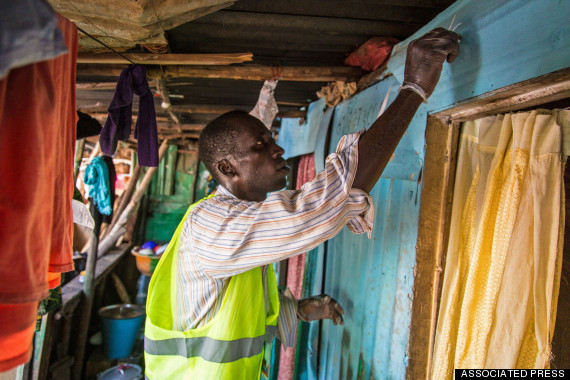FREETOWN, Sierra Leone (AP) — Some residents ran from their homes in Sierra Leone to avoid being trapped during a three-day lockdown to contain the Ebola outbreak, a health worker said Saturday, a minor setback on the second day of a massive effort to confine 6 million people to their homes.
Nearly 30,000 volunteers and health care workers fanned out across the country on Friday and Saturday to distribute soap and information on how to prevent Ebola, which the World Health Organization says has killed more than 560 people in Sierra Leone and more than 2,600 in the region. The outreach campaign coincided with the sweeping three-day lockdown so that volunteers could conduct house-to-house searches to identify sick people reluctant or unable to seek treatment for Ebola.

A health worker volunteer marks a home with chalk to identify that it has been visited, as they distribute bars of soap and information about Ebola in Freetown, Sierra Leone, Saturday, Sept. 20, 2014.
Marathon runner Idrissa Kargbo, 23, is back in Sierra Leone to help the volunteers.
As a boy, Kargbo sprinted through the villages of Sierra Leone on errands for his grandmother and later as a coffee courier. Now his times have qualified him for races on three continents.
In an interview with The Associated Press on Saturday, Kargbo said the Freetown residents he’d visited were grateful for whatever information they could get.
“Some people are still denying, but now when you go to almost any house they say, ‘Come inside, come and teach us what we need to do to prevent,'” Kargbo said. “Nobody is annoyed by us.”

Idrissa Kargbo, Sierra Leone’s national marathon champion, helps volunteers distribute information on Ebola in Freetown, Sierra Leone.
For Kargbo, spreading Ebola awareness was a welcome break from idleness after the outbreak cut off all opportunities for him to train and compete. He had been planning to run the Liberia Marathon in August, having placed second in the race last year, but it was postponed until at least early 2015 as the outbreak in that country spiraled out of control.
The stadium where he normally trains in Freetown has also been closed, he said, and his work as a coffee courier was put on hold because most of the clients — international NGO workers — have fled the country.
“Most of those NGO people are going out,” Kargbo said. “Right now, I don’t have the chance to go anywhere. I don’t have the chance to train.”
Sierra Leone’s government is clearly hoping the lockdown will help turn the tide against the disease. In a speech before it began, President Ernest Bai Koroma said “the survival and dignity of each and every Sierra Leonean” was at stake.

A health worker volunteer talks with residents on how to prevent and identify the Ebola virus in others, and distributes bars of soap in Freetown, Sierra Leone, Saturday, Sept. 20, 2014.
The strategy is controversial, however. After it was announced earlier this month, Doctors Without Borders warned it would be “extremely difficult for health workers to accurately identify cases through door-to-door screening.”
Even if suspected cases are identified during the lockdown, the group said Sierra Leone wouldn’t have enough beds for them.
In northern Sierra Leone, health worker Lamin Unisa Camara said Saturday he had received some reports that residents had run away from their homes to avoid being trapped during the lockdown.
“I was informed that people were running from their houses to the bush. Without wasting time, I informed the chief in charge of the area to call his people,” said Camara, who was working in the town of Kambia.

Police guard a roadblock as Sierra Leone government enforces a three day lock down on movement of all people in an attempt to fight the Ebola virus in Freetown, Sierra Leone, Friday, Sept. 19, 2014.
Several health care workers and volunteers complained that supply kits were delivered late, preventing their teams from starting on time. The kits contain bars of soap, cards listing Ebola symptoms, stickers to mark houses visited and a tally sheet to record suspected cases.
Kargbo, however, said his team got to work on time and was on track to meet its goal of visiting 60 households by the end of the lockdown Sunday.
He said the effort would be worth it if the outbreak is shortened even a little. Once it’s over, he is looking forward to getting back to a running career that has taken him to races in London and New York in the last year.
“I want this to be finished so I can have the chance to train and go to other countries,” he said. “That’s why I volunteered to do it.”

An empty local market area is seen, as Sierra Leone government enforces a three day lock-down on movement of all people in a attempt to fight the Ebola virus, in Freetown, Sierra Leone, Friday, Sept. 19, 2014.
__
Corey-Boulet reported from Abidjan, Ivory Coast. Youssouf Bah in Kambia, Sierra Leone, and Michael Duff in Freetown, Sierra Leone, contributed to this report.
